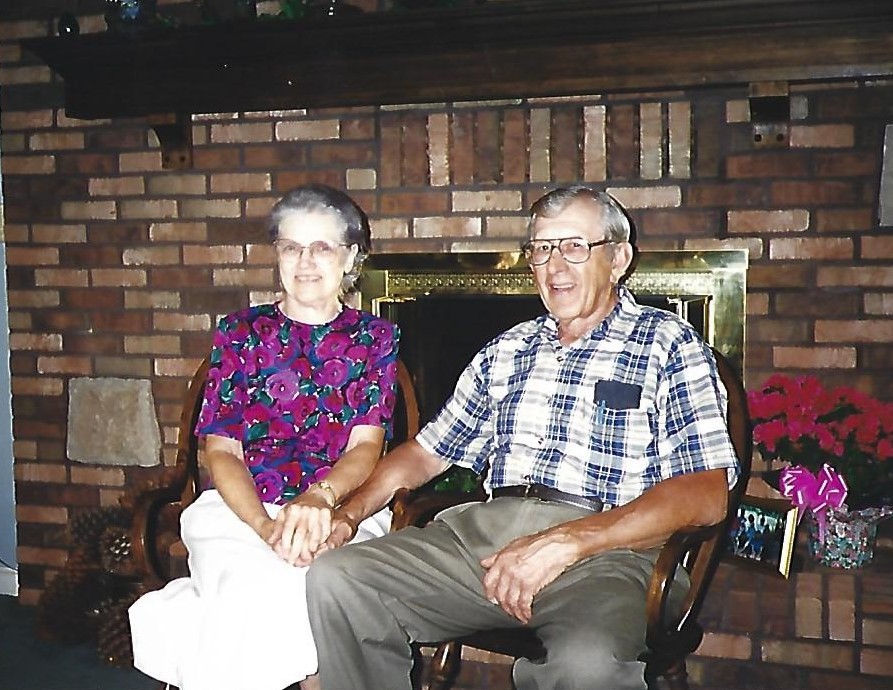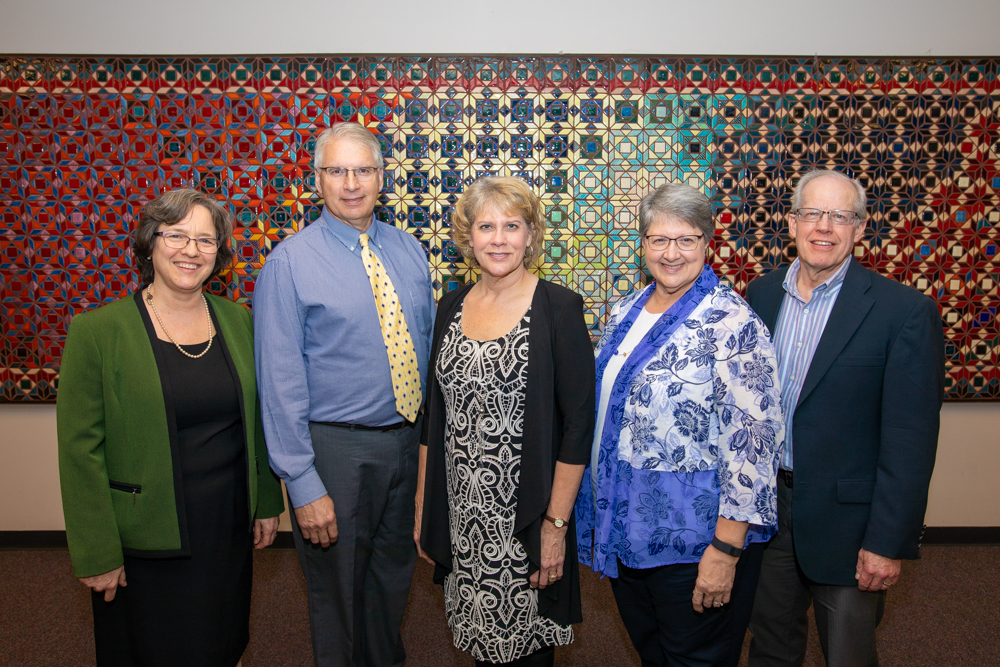Like the parable of the loaves and fishes, one pastor’s visionary donation more than 20 years ago and his family’s ongoing support to the Clinical Pastoral Education (CPE) program at Eastern Mennonite Seminary has generated exponential blessings.
If each one of the nearly 300 students who has taken CPE has ministered to at least 100 people, that makes for at least 30,000 who have been blessed by their gift, estimated Lonnie Yoder, professor of pastoral care and counseling. “The gift of the Yutzy family has impacted lives far beyond what we can imagine.”
Last week’s evening banquet, held during the seminary’s annual School for Leadership Training, brought together celebrants of the program’s 20-year anniversary. Among the audience were CPE alumni, seminary faculty and program advisory council members, EMU cabinet members and trustees.

The honored guests were the family of Lena and Norman Yutzy ’55, SEM ‘58, who provided the $1 million CPE program endowment: daughter Lenora Yutzy Bell ‘79 and husband Rick, daughter Charlene Yutzy Jacob ‘88, son David Yutzy ‘82 and wife Jewel; and grandson Ben Yutzy ‘06, with wife Risa Heatwole Yutzy and their two children.
Program focused on ministering to people in crisis
CPE is “interfaith professional education for ministry” that brings “theological students and ministers into supervised encounter with people in crisis,” according to the Association of Clinical Pastoral Education. The curricula integrates practice, reflection and analysis, and a foundation of knowledge around theories of behavioral science.
Guest speaker Sara Wenger Shenk, who was the seminary’s interim dean when the program began and is now president emeritus of Anabaptist Biblical Mennonite Seminary, described “the practice of CPE and pastoral formation as “learning to be human, learning to be at home in our own bodies, histories, families, limitations and strengths, learning both what it means to flourish as embodied mortal human beings and flourish to as spiritual beings.”
CPE practices, she said, “help to move pastors on the long arduous journey to becoming comfortable in our own skin, to find a place of deep calm in the midst of crisis, to stay calm when panic threatens everyone in the room … learning to stay grounded in that non-anxious place, to trust and not be afraid as we weather crisis, deaths, serious events, profound regrets … learning the remarkable beauty and harmony of all we’ve learned of christ’s love and pain.”
A gift in thanks for his own learning
A native of Plain City, Ohio, Norman Yutzy attended school through the 10th grade, then earned his GED and continued to feed his appetite for knowledge at then Eastern Mennonite College, where he eventually earned three degrees: a BA degree (1955), a bachelor of theology degree (1958) and finally, at the seminary, a bachelor of divinity degree (1961). While at EMC, he met and married Lena Beachy (the couple were engaged during an evangelizing tour in Europe).
His first encounter with CPE was while earning a master’s degree at Princeton Theological Seminary, and he regarded that experience as profoundly beneficial for his life and ministry. Yutzy would go on to careers in teaching and the ministry: he taught Bible at EMC and Eastern Mennonite High School during the late 50s and early 60s, and held pastorates at churches in Illinois Pennsylvania and Virginia. After beginning a career as a successful dairy and poultry farmer, he pastored on an interim basis and continued to preach on request.
In 1993, Yutzy first met with seminary administration to share his idea of beginning a CPE program.* Ever thankful for his own CPE experience, “he desired others to receive that gift for use in their ministries,” recalled son Dave Yutzy. Endowing such a program at the seminary was a way that he and Lena could contribute towards “supporting ministries that blessed others’ lives and furthered the work of God’s Kingdom.”
Norman Yutzy’s idea was truly visionary: he hoped the CPE curricula and experiential learning would be a requisite for graduation. Basing the program at an institution of higher learning, instead of at medical facilities or psychiatric hospitals, would help to integrate the CPE curricula, mentorship and experiential learning model that Yutzy found so valuable to his own pastoral formation into the formal education of seminarians.
By 1999, when six students enrolled, EMS was only the third seminary in the United States to host CPE (it was initially a Satellite Center under the UVa Health System’s Department of Chaplaincy Services). Later that year, Kenton Derstine became the program’s first (and until recently, only) director.
Recognition of first director’s leadership
At the banquet, Derstine recalled his own personal connection to Norman Yutzy, who was his pastor at Souderton Mennonite Church in Pennsylvania. “I was a teenager then and he would often stop to purchase milk at our farm and get into lengthy conversations with my father about church matters … Even now, I still marvel at the mystery of how our paths would cross later.”
The evening included recognition of Derstine’s long contributions to the program and his “strong and visionary leadership,” Yoder said. Under his guidance, the program is now accredited to offer units of Level I and II and Supervisory CPE. Initially EMS developed relationships with Rockingham Memorial Hospital (now Sentara RMH) and the Virginia Mennonite Retirement Community (VMRC) for clinical placements. Opportunities have expanded to Sunnyside Presbyterian Retirement Community and the Bridgewater Retirement Community.
New director Penny Driediger, who has been serving as a clinical educator since 2010, is also a staff chaplain at Rockingham Memorial Hospital.
On the occasion of the program’s 20th anniversary, Derstine has been able to reconnect with many past students. “It has been gratifying to learn how so many alumni have gone on to serve as transformative ministers and leaders in a wide variety of ministry contexts, noting the value of their CPE experience for their life and ministry,” he said. “In sum, I think it remarkable how one person’s transformative experience in CPE birthed a vision to multiply that experience for others, generating a vision and resources that when joined to that of others has produced this powerful legacy.”
*CPE had been offered at the seminary before. An extended unit of CPE was offered for more than 10 years from EMU Lancaster, with internship settings at Landis Homes in Lititz, Pa., and Garden Spot Village, in New Holland, Pa.
Additionally, from the Harrisonburg campus, from 1980-83, Will Agee (based at Western State Hospital in Staunton) supervised three units of CPE at Rockingham Memorial Hospital for EMS students and others. This involved 23 interns over the three-year period.
